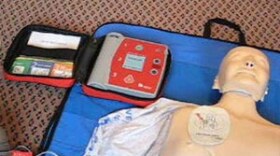A disease called cardiometabolic multimorbidity (CM) affected more than 34 million people in 2018 – the latest national numbers. And the numbers are growing.
People with the disease suffer from having two cardiac risk factors at the same time – type-2 diabetes and heart disease, for example.
However, a new study suggests three cups of coffee daily may help lower your chances of getting the disease.
KERA’s Sam Baker talks about this with Dr. Sreenivas Gudimetla, a cardiologist with Texas Health Fort Worth.
What's behind the Multimorbidity?
People are prone to developing type 2 diabetes mellitus. As we get older, we develop hypertension over time. These risk factors, along with other risk factors such as high cholesterol, lack of exercise, and physical activity and certainly genetic components increases the risk of development of cholesterol plaques both in the heart arteries as well as other arteries to other organs such as the brain, the kidneys and the lower extremities.
And, over time, event rates such as heart attacks and strokes and lack of blood flow to the limbs increases.
So all of that can add up to the point that you might have more than one risk factor at a time.
That is correct.
The study did not specify a cause and effect. But why would three cups of coffee or tea, together with the caffeine, lower the chances of CM?
There's been a lot of study that has demonstrated some benefit in terms of the reduction of cardiovascular disease.
Presumed mechanisms include:
- a benefit in terms of what we call insulin sensitivity. When you have increased insulin sensitivity, you have a reduction in blood sugars, which of course has a beneficial effect.
- Some studies demonstrate that there may be a potential reduction in LDL cholesterol,
- There is also some thought that caffeinated beverages may have antioxidant effects.
We're talking about coffee and tea. But if a person consumed soda, would that achieve the same thing?
Not nearly to the extent, because soda actually contains a lot less caffeine than coffee does.
And of course, you wouldn't want all the sugar that came with the soda to begin with, I guess.
Absolutely not.
So, the takeaway from this for people who might be inclined to go out and rush to Starbucks feeling they have a safety net around them, is that we don't know for a fact that this will lower steam, but rather there is a chance it might?
I think the latter is actually the take home message that there's a chance it might lower cardiovascular mortality.
In the meantime, how can you avoid CM?
The number one factor in reducing cardiovascular mortality is behaviors and behaviors, starting very young in age, such as:
- Learning how to eat a heart-healthy diet
- Exercising
- Don't smoke
If you keep an ideal weight, then your risk of developing diabetes in the future goes way down. Right now, we are in a bit of an epidemic with the obesity issue and we are seeing a much younger cohort of patients develop type two diabetes mellitus.
The other thing you want to do is a blood pressure control, know your cholesterol numbers and avoid behaviors that increase cardiovascular risk and particularly tobacco use.
RESOURCES:
Drinking coffee in moderation linked to lower diabetes, heart disease risk
Trends in the Prevalence of Cardiometabolic Multimorbidity in the United States, 1999–2018





